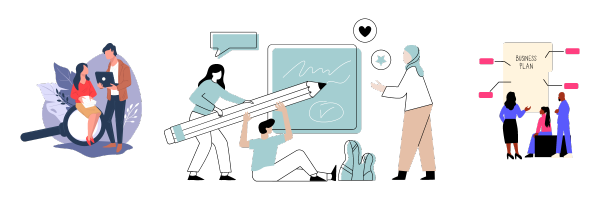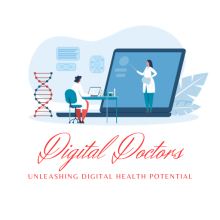Inspirational journeys
Follow the stories of academics and their research expeditions
mHealth Remote Medical and Healthcare Roles: Opportunities, Top Companies, Resources, and Success Strategies

The landscape of healthcare has transformed significantly in
the digital age, with mobile health (mHealth) playing an instrumental role in
driving this evolution. mHealth refers to the use of mobile technologies such
as smartphones, tablets, and other wireless devices to support medical and
healthcare services. It spans a wide range of functions, from telemedicine
consultations and remote diagnostics to patient monitoring and health data
management. As the demand for remote healthcare services grows, so does the
need for professionals skilled in mHealth roles.
This comprehensive guide explores the exciting world of
mHealth remote medical and healthcare careers. We will discuss the top
companies actively recruiting for these roles, provide a curated list of
resources for further learning, and share invaluable tips and strategies to
succeed in this growing sector.
The Rise of mHealth in Remote Medical and Healthcare
Roles
The COVID-19 pandemic accelerated the adoption of digital
health solutions as face-to-face consultations became challenging. Today, the
need for accessible, convenient, and efficient healthcare services is greater
than ever, pushing the expansion of mHealth across all areas of healthcare.
From remote patient monitoring to virtual clinical trials, mHealth technologies
are helping to bridge the gap between healthcare providers and patients,
particularly in underserved regions.
Why mHealth?
- Accessibility:
Patients in remote or rural areas can access high-quality healthcare
without having to travel long distances.
- Cost-Effectiveness:
Remote monitoring and telehealth solutions often reduce the need for
in-person consultations, lowering healthcare costs for both providers and
patients.
- Efficiency:
Digital tools facilitate faster communication, data sharing, and
decision-making, improving overall healthcare outcomes.
- Personalized
Care: mHealth enables providers to offer more personalized and
continuous care through real-time data collection and analysis.
The increasing reliance on mHealth creates a wide array of
remote job opportunities for healthcare professionals, especially those with
the right technical skills.
Top Remote Medical and Healthcare Roles in mHealth
- Telemedicine
Physicians
- Role
Overview: Telemedicine physicians provide virtual consultations to
diagnose and treat patients through video calls, messaging apps, and
other digital communication tools.
- Skills
Needed: Strong diagnostic and communication skills, familiarity with
telehealth platforms, board certification, and licensure in the
appropriate state or country.
- Why
It’s Important: Telemedicine enables patients to access specialist
care without geographical barriers, increasing access to care for
underserved populations.
- Remote
Medical Coders and Billers
- Role
Overview: These professionals are responsible for translating
healthcare services into medical codes for billing and insurance
purposes. They play a critical role in ensuring the accuracy of claims
and revenue cycles.
- Skills
Needed: Knowledge of coding systems (CPT, ICD-10), attention to
detail, proficiency in billing software.
- Why
It’s Important: Medical coders and billers help healthcare
organizations manage their finances effectively, ensuring that providers
are reimbursed for their services.
- mHealth
App Developers
- Role
Overview: Developers in this field design and build mobile apps for
health monitoring, telemedicine consultations, patient education, and
more.
- Skills
Needed: Proficiency in coding languages (Swift, Java, Python),
experience in healthcare or health tech, UI/UX design skills.
- Why
It’s Important: Well-designed mHealth apps empower patients to take
control of their health, improve self-management of chronic conditions,
and enhance the patient-provider relationship.
- Remote
Health Data Analysts
- Role
Overview: Health data analysts collect and analyze data from mHealth
platforms to improve healthcare delivery, patient outcomes, and
operational efficiency.
- Skills
Needed: Strong analytical skills, experience with data visualization
tools (Tableau, Power BI), knowledge of healthcare analytics.
- Why
It’s Important: Data analytics can identify trends and insights that
lead to better decision-making and patient outcomes.
- Virtual
Health Coaches
- Role
Overview: Virtual health coaches work with patients remotely to
provide guidance on health goals, lifestyle changes, and chronic disease
management.
- Skills
Needed: Strong communication and motivational skills, knowledge of
health coaching methodologies, certification in relevant areas
(nutrition, exercise, chronic disease management).
- Why
It’s Important: Health coaches help patients stay on track with their
health goals, improving overall wellness and preventing future health
issues.
- Telepharmacists
- Role
Overview: Telepharmacists provide remote pharmaceutical care,
including medication management, patient counseling, and drug therapy
monitoring.
- Skills
Needed: Licensed pharmacist credentials, strong communication skills,
familiarity with telepharmacy platforms.
- Why
It’s Important: Telepharmacy expands access to pharmacy services,
particularly in rural and underserved areas, ensuring patients receive
timely medication management.
- Remote
Clinical Trial Coordinators
- Role
Overview: These professionals oversee the management of clinical
trials remotely, ensuring compliance with regulatory standards and
monitoring trial progress.
- Skills
Needed: Experience in clinical research, knowledge of regulatory
requirements, project management skills.
- Why
It’s Important: Remote coordination allows for decentralized clinical
trials, making it easier to recruit diverse populations and reduce
barriers to participation.
Top Companies Actively Recruiting for mHealth Remote
Roles
- Teladoc
Health
- Website:
www.teladochealth.com
- Overview:
Teladoc is a global leader in telemedicine, providing a wide range of
virtual healthcare services, including teleconsultations, mental health
support, and chronic condition management.
- Jobs:
Telemedicine physicians, nurse practitioners, mental health therapists,
health coaches.
- American
Well (Amwell)
- Website:
www.amwell.com
- Overview:
Amwell connects patients with healthcare providers for virtual
consultations and telehealth services. They offer both direct-to-consumer
and enterprise solutions for hospitals and healthcare systems.
- Jobs:
Telemedicine physicians, software developers, health data analysts,
customer service representatives.
- Babylon
Health
- Website:
www.babylonhealth.com
- Overview:
Babylon Health leverages AI-powered health tools and telehealth
consultations to provide remote healthcare services.
- Jobs:
Remote physicians, AI developers, virtual health coaches, healthcare
analysts.
- Doctor
on Demand
- Website:
www.doctorondemand.com
- Overview:
Doctor on Demand offers 24/7 access to board-certified physicians,
psychologists, and psychiatrists via virtual visits.
- Jobs:
Telemedicine doctors, mental health providers, telehealth coordinators,
customer support specialists.
- CVS
Health
- Website:
www.cvshealth.com
- Overview:
CVS Health, through its telehealth and virtual care offerings, provides
remote patient monitoring, telepharmacy, and chronic disease management
services.
- Jobs:
Telepharmacists, nurse practitioners, remote patient care coordinators,
telemedicine physicians.
- HealthTap
- Website:
www.healthtap.com
- Overview:
HealthTap provides virtual healthcare solutions through video consults
with a network of doctors across various specialties.
- Jobs:
Telemedicine physicians, product managers, software developers, medical
content writers.
Curated List of Online Resources for mHealth Careers
- Telehealth
Certification Institute
- Website:
https://www.telehealthcertificationinstitute.com
- Overview:
Offers training and certification programs for telehealth professionals
across different fields.
- American
Telemedicine Association (ATA)
- Website:
https://www.americantelemed.org
- Overview:
A leading resource for telemedicine news, education, and advocacy. Their
site offers webinars, conferences, and certification programs.
- mHealth
Alliance
- Website:
https://www.mhealthknowledge.org
- Overview:
Provides a wealth of knowledge on mobile health technologies and global
case studies. It’s a valuable resource for understanding the impact of
mHealth on global health systems.
- HealthIT.gov
- Website:
https://www.healthit.gov
- Overview:
This government-run website offers extensive resources on telehealth
technologies, mHealth, and their applications in healthcare.
- Coursera:
Digital Health and Telemedicine Courses
- Website:
https://www.coursera.org
- Overview:
Offers online courses from leading universities and institutions,
including telemedicine and digital health certifications.
Tips and Strategies for Succeeding in mHealth Remote
Roles
- Stay
Updated on mHealth Trends: mHealth technologies are constantly
evolving. Keep up with the latest trends by subscribing to industry
publications, attending virtual conferences, and networking with
professionals in the field.
- Invest
in Relevant Certifications: Many mHealth roles require specific skills
in telemedicine, data analytics, or app development. Consider earning
certifications in telehealth, medical coding, or data analysis to enhance
your qualifications.
- Emphasize
Soft Skills: Remote healthcare professionals must have excellent
communication skills, as they interact with patients, colleagues, and
clients virtually. Demonstrating empathy, active listening, and cultural
competence can set you apart.
- Leverage
Digital Tools: Familiarize yourself with telemedicine platforms,
electronic health records (EHR) systems, and health monitoring apps.
Mastering these tools can improve your efficiency and adaptability in
remote roles.
- Join
mHealth Professional Networks: Networking is key to finding remote
opportunities. Join professional groups on LinkedIn, participate in
virtual job fairs, and connect with healthcare professionals involved in
mHealth.
- Focus
on Data Security and Privacy: Handling sensitive patient information
remotely requires a strong understanding of data privacy regulations, such
as HIPAA in the U.S. Make sure you are compliant with relevant laws and
best practices for data security.
Conclusion
The mHealth sector offers a wealth of opportunities for
healthcare professionals to engage in fulfilling, high-impact work from the
comfort of their homes. From telemedicine physicians to mHealth app developers,
the demand for remote healthcare roles is surging as patients and providers
alike recognize the convenience and accessibility that mobile health
technologies provide.
By staying informed, pursuing relevant certifications, and
sharpening your technical and interpersonal skills, you can position yourself
for success in this rapidly growing field. Whether you are just beginning your
healthcare career or looking to make a transition, mHealth offers a pathway to
innovate, grow, and make a meaningful difference in the future of healthcare.
Tags:
mHealth remote medical roles telemedicine jobs telehealth careers healthcare remote jobs mobile health digital health virtual healthcare telepharmacy jobs health data analyst top companies in mHealth telehealth resources mHealth certifications0 Comments
Categories
- Career Development and Opportunities in Digital Health 166
- White Papers 39
- IELTS For Medical Professional 35
- OET Exam Preparation 30
- Entrepreneurship and Innovation 26
- Healthcare Innovation 17





Leave a comment